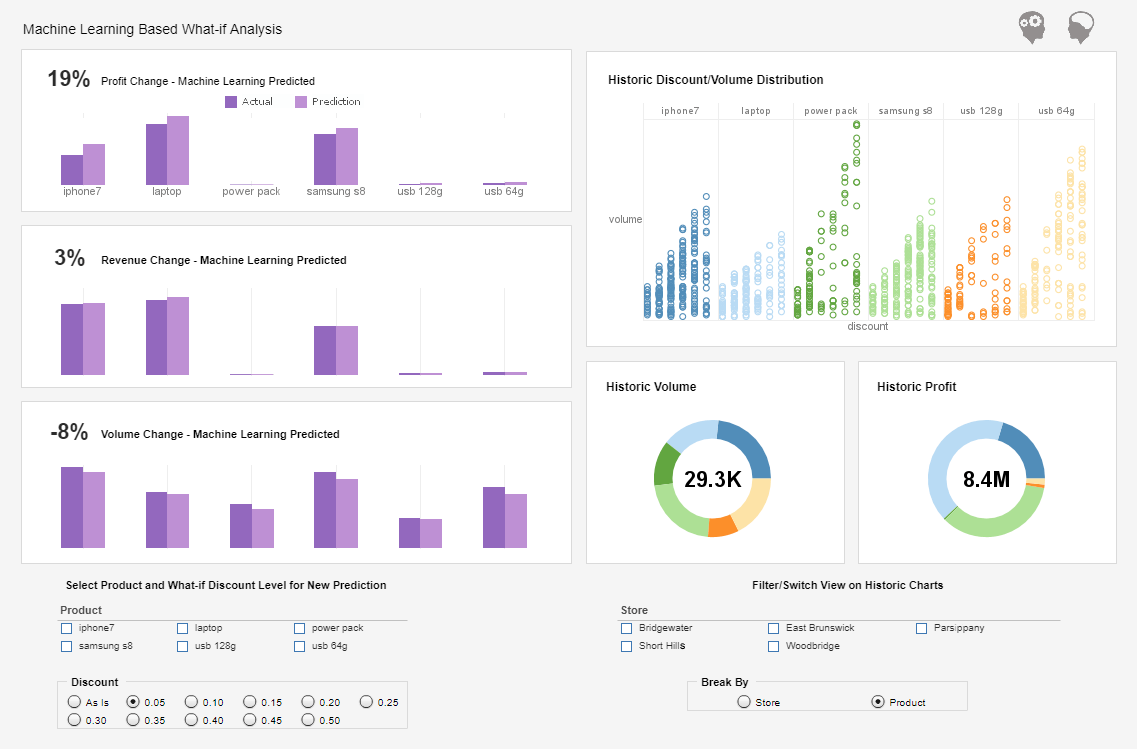InetSoft Webinar: Enabling the Intelligent Enterprise with Machine Learning
Below is the transcript of a Webinar hosted by InetSoft in August 2018 on the topic of Enabling the Intelligent Enterprise with Machine Learning. The presenter is Abhishek Gupta, Product Manager at InetSoft.
I recently read that two-thirds of the CEOs of global 2000 enterprises are going to have digital transformation as the center of their corporate strategy. In order to achieve this, enterprises are going to have to embrace machine learning. An enterprise needs to start reimagining their customer value and the internal operating model by implementing machine learning solutions now.
Machine learning intelligently connects people, things and businesses, and it's connecting usual experiences. It's connecting devices and APIs that promote a network of efficiency and innovation throughout the whole organization. Forecasts indicate machine learning will grow by almost 50% by 2020 and is having a huge impact on the knowledge economy, of course.
Machine learning systems and knowledge workers will be able to work together much more effectively and much more successfully with the help of machine learning. Furthermore the market is expected to be worth almost $47 billion by 2020. I think enterprises should begin to consider implementing a machine learning strategy into their infrastructure.
It's, of course, not without any challenges. Enterprise needs to have a modern business environment conducive to adapting machine learning technologies. Legacy systems and a silo approach to data analytics are not optimal environments for supporting machine learning strategies.
| #1 Ranking: Read how InetSoft was rated #1 for user adoption in G2's user survey-based index | Read More |
On the other hand agile multi-disciplinary teams' process and technologies are integral in the modern business environment. This is the way to go. Businesses might not be aware that machine learning has practical applications for enterprise models now already, and it is not any futuristic concept anymore. That's what we're going to talk today about.
Applications are ready to go today. Automating machine learning technology is probably in its early stage, but it's rapidly advancing its development. During this webinar today I will cover a number of topics, and the first one is called machine learning and combination with artificial intelligence. We will explain why is it advancing so rapidly. What are the digital benefits? We are going to discuss some use cases. We are going to discuss some innovative machine learning technology and applications and how you can get started with your enterprise.
Let's begin our discussion today by addressing our first topic and giving an overview of machine learning and artificial intelligence. Artificial Intelligence is also abbreviated as AI. It mimics the cognitive function, and it is the learning and problem solving and is more or less similar to how humans do it. It enhances the human capabilities and provides you with better decision making abilities as well.
It's also capable of intelligent behavior, and it's the enabler for the creation of intelligent machines. Let's give some information on the history of artificial intelligence.
 |
View a 2-minute demonstration of InetSoft's easy, agile, and robust BI software. |
Artificial intelligence started out as a discipline in the late 1950s, early 1960s and has been going through a series of waves. These were cycles of very high expectations. For example, when the first artificial neuron from McCulloch-Pitts was invented, it was followed by cycles of disillusionment when things like the inability of simple perceptions to learn the XOR function were discovered.
Right now we're on another wave of intensive interest in machine learning because since 2013 for the first time neural networks and deep learning based systems are starting to perform on par with or outperform humans on a range of real world tasks like image processing, image recognition, natural language speech or natural language text processing, which also are usually useful for the enterprise.
Where is artificial intelligence going to take us? I think we're at an inflection point here where right now. The universe of unstructured information is being unlocked by machine learning and artificial intelligence. Especially enterprise systems in the past have dealt with tabular data, everything arranged in little rows and columns.
We have the potential to push outwards the boundaries of enterprise systems into unstructured information processing and into the wider world of business and supporting systems. Looking forward how artificial intelligence and machine learning will help us both to augment and automate routine tasks, especially those based on digital data as well as drive new scenarios that were hitherto completely impossible to do with computers.
| Next: Machine Learning Utilized For Predictive Analytics |


